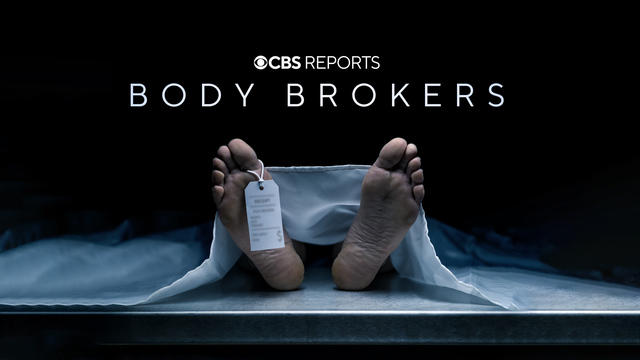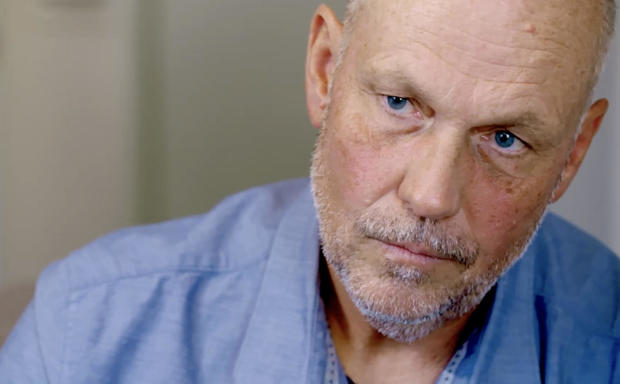▶ Watch Video: Body Brokers | CBS Reports
Watch the CBS Reports documentary “Body Brokers” in the video player above.
Every year, an estimated 20,000 people donate their bodies to science for the purpose of medical research and education. But unlike organ donation, these body parts can be bought and sold for profit — a market with very few federal regulations.
Special Agent Paul Micah Johnson, an investigator for the FBI’s Detroit Division, has spent the last decade looking into what he called a “vast gray and black market of dead human bodies.”
The Uniform Anatomical Gift Act, a statute adopted by 47 states, is one of the few regulations governing the non-transplant tissue industry. It outlines the standards for body donation, and most significantly, it requires that donors, or their loved ones, must provide informed consent before donation takes place.
These consent agreements between donors and tissue banks typically stipulate that the body will be used for research and education — but what that means in practice can vary.
“Medical research and education, particularly education, is a vague term and it is not clearly defined even in the Uniform Anatomical Gift Act,” says Johnson. “The misleading of families across the industry is quite common.”
While most donors consent to donation for research and education, legally, the agreements can include addendums that allow for donors to be used for “non-medical projects” that can include “crime scene investigation” and “vehicle safety.”
Steve Hansen had always wanted to be an organ donor, but when he died in 2012 from cirrhosis of the liver, doctors said his organs were not healthy enough to be transplanted. Steve’s wife Jill Hansen says hospice workers at the time suggested whole body donation as an alternative.
“What I envisioned was him being in some medical facility,” Hansen says. “I just thought, what a great candidate for them to learn about the results of alcoholism and what it does to a body.”
Steve’s body was eventually sent to the Biological Resource Center in Phoenix, Arizona, which then sold his remains to the Department of Defense.
“They told me specifically that my husband had been used as a crash test dummy in a simulated Humvee explosion,” Hansen says.
Hansen’s husband’s body was sold by Biological Resource Center founder Stephen Gore to the DOD without her consent. Court records showed that those donors were used in a variety of military and ballistics testing, with some resulting in “the complete mutilation and desecration of the donor’s body.”
“I was devastated,” Hansen says. “I would’ve never done it if I had known. I just kept telling him I was sorry.”
When the FBI raided Gore’s warehouse in 2014, they found conditions of the donors’ remains so abhorrent that agents “required trauma therapy due to the disturbing, graphic scene they encountered.”
Gore pleaded guilty to Illegal Control of an Enterprise for violating donor consent agreements and was sentenced to four years probation and one year in jail. Because there are few laws defining ethical treatment of remains, no charges were filed relating to the warehouse conditions.
Disturbing evidence also emerged during Special Agent Johnson’s investigation into body broker Arthur Rathburn, whose Detroit warehouse was later described by investigators as a “house of horrors.”
“He cut up bodies with a chainsaw. He cut up bodies with a bandsaw,” Johnson says. “He had a bucket filled with brown liquid that had fetuses and human brains floating in it.”
As in the case with Gore, prosecutors had no way of charging Rathburn for how donors’ bodies were treated. Rathburn was ultimately sentenced in 2018 to nine years in prison for falsifying his donor’s medical information in order to fraudulently sell bodies infected with hepatitis and HIV.
“He had trash cans filled with human heads,” Johnson says. “Just the disrespectful way of treating the remains. And yet we prosecuted him for fraud.”
In 2009, Donor Referral Services owner Philip Guyett Jr., pleaded guilty to wire fraud for falsifying medical information in order to offload tissue designated for transplant with infectious or communicable diseases. He was sentenced to eight years in prison.
“As I told the judge, I had no business being in this business,” Guyett says in an interview with CBS News. “A person with no medical experience, no funeral director’s license, was able to open up a whole body donation program, take possession of a human body, dismember it, send it throughout the nation without any type of licensing oversight. It’s harder to sell hot dogs on a cart than it is to get into this business.”
Before opening his own tissue bank, Guyett got his start running a university’s Willed Body Program, overseeing the donations of bodies for research education.
In the wake of industry controversies, some tissue bankers have been working to promote trust with potential donors.
Garland Shreves is the founder of Research For Life, a non-transplant tissue bank based in Phoenix that distributes body parts for use towards the advancement of science in lifesaving fields like first-responder training, medical device development and surgical practice.
“I don’t think we can ever lose sight of the fact that these are human beings and they have so graciously donated their body to the advancement of medicine,” Shreves says. “Whole body donation and my organization, through the wonderful gift of that donor, makes it possible for us to have the innovative medicine that we do today in this country.”
Shreves says the best way to clean up the industry is transparency.
“Bad actors are bad for business. If the consumer is being harmed by a business that’s not operating at a very high level of professionalism, everyone in the industry suffers,” he says. “It is that transparency, the sunlight, the disinfectant, if you will. It’s what we need to do as an industry and we haven’t done enough of it.”
Johnson says the whole body donation industry is necessary for the advancement of science, and that it is vital the industry works to restore the public’s trust.
“It would be nice if there was one playbook for everyone. And so that would ideally be federal and it would cover everyone that deals with human body parts — for-profit, nonprofit, all of them under one set of rules.”
In September 2022, a body broker bill was introduced in the U.S. Senate which would impose federal regulations on the process of body donation, but no vote has been scheduled.






































